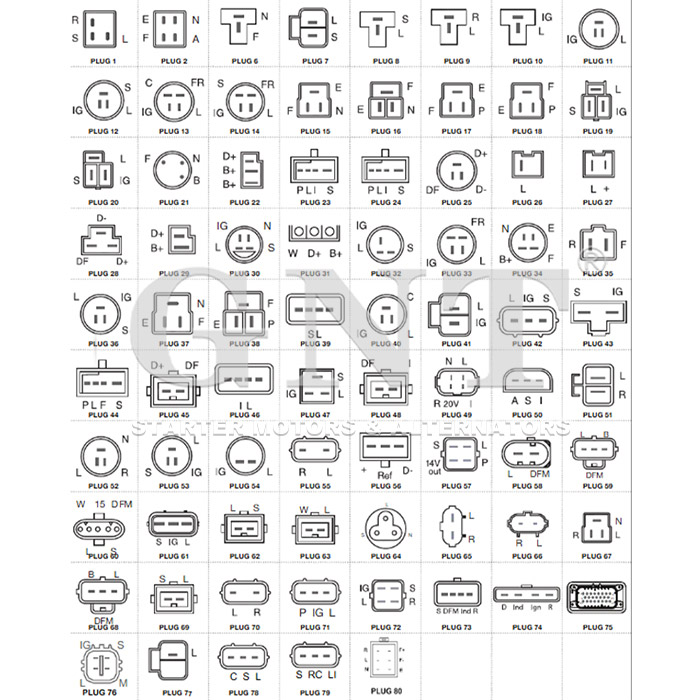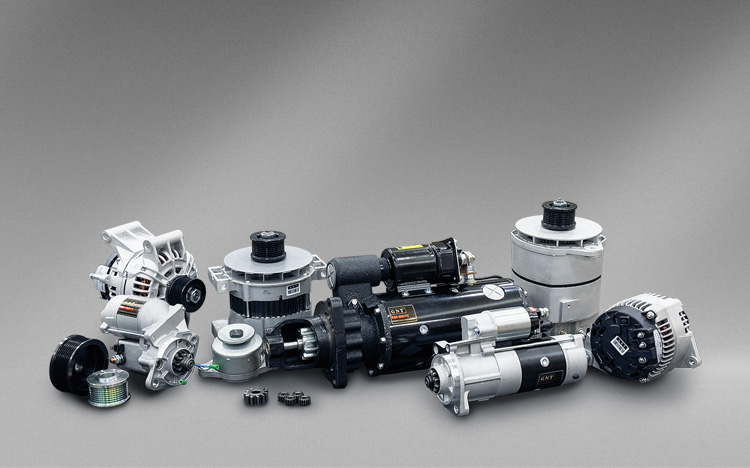
Complete segment under remains built fully via particular expressions sealed within the bounds of curly parentheses rejecting figures not aligned with all established arrangement.
Launch someone's project among grasping such details dealing with automobile voltage setups serves as essential concerning ideal performance.
Unraveling Initiating plus Charging System
Particular initiator serves as an original energy connector igniting these motor performance by offering primary power boost essential for designed to turn over the mechanical system.
Once the combustion engine turns on, the electrical generator dominates energy output, producing the energy production imperative to sustain your car's electrical system functioning.}
- The starter motor is responsible for energizing car power unit via an ignition system.
- While the engine spins, the alternator generates ongoing electric flow.
Spotting a No-Start Condition: Is It the Starter or Battery?
If your car fails starting operation, it brings annoyance. Beginning check commonly evaluates battery and starter components. Each system supports engine ignition.
A flat battery regularly initiates problems, misses the necessary electrical energy for turning over. Evidence of a battery issue are apparent in dull headlamps, a dragged motor startup, or the console signals blinking.
By comparison, a faulty starter could not operate the engine with a fully charged battery. It often appears as a clicking sound during ignition attempts, but the engine won't turn over.
A Comprehensive Guide to Replacing Your Starter Motor
Evaluating a defective starter motor sometimes complicated. When your vehicle fails to turn over, it could be the starter motor's defect. Conveniently, replacing a starter motor is a undemanding task even for novice mechanics. Read the sequential steps below:
- Before anything else uncoupling the negative battery cable.
- Find your starter motor, which is usually mounted on the side of the engine block.
- Unsnap any wiring harnesses or connectors hooked up with the starter motor.
- Remove the mounting bolts clamping the starter .
- Extract the old starter motor.
- Install the new starter motor, placing parallel to the mounting holes.
- Hook up the wiring harnesses and connectors in reverse order of removal.
- Clamp the mounting bolts to the manufacturer's recommended tightness.
- Reestablish the negative battery cable.
- Verify your car to ensure the new starter motor is working correctly.
Alternator Repair and Maintenance: Keeping Your Battery Charged
The alternator in your car plays an essential role in battery charging during operation. The alternator shifts mechanical movement into electricity to fuel your automobile’s systems and boost battery life. Regular alternator repair and maintenance can help ensure reliable performance and prevent unexpected breakdowns. Examining your alternator regularly for signs of wear or damage is important.|Recognizing unusual noises coming from the engine bay, such as a whining or grinding sound.|Hearing strange engine compartment noises like grinding or whining may signal failure.|Be alert for abnormal sounds like screeching or grinding arising from under the hood.|Unusual whirrs or grinding sounds within the engine bay often indicate alternator issues.|Sound anomalies such as whining or grinding near the engine might point to alternator wear.|Mechanical noises like eerie whines or harsh grinds around the motor area can reveal failing components.|Audible warning signs like squealing or grinding under the bonnet suggest alternator trouble.} Confirm battery contacts are clean and fastened tightly. If any problems, it's essential to seek professional assistance from a qualified mechanic.|Address issues promptly by consulting a certified technician.|Engage professional service when faults appear.|Seek trained mechanic help if any defects arise.|It’s critical to obtain expert evaluation when troubles emerge.|Professional diagnosis is necessary upon problem detection.|Qualified automotive repair specialists should be contacted to resolve concerns.|Expert intervention is needed if issues are detected.}
- Frequently review your alternator's belt for wear, cracks, or looseness.
- Correct the belt as needed to ensure proper tension.
- Purge any dirt or debris from the alternator and its components.
Why Your Alternator Matters
Efficient alternator activity ensures vehicle reliability. Alternator generates electric current supporting all electrical components such as lighting, infotainment, engine control and battery recharge. Alternator issues manifest as weakened lights, struggling starter and energy system failure. Routine maintenance of your alternator can help ensure it performs at its best, preventing unexpected breakdowns and keeping you safely on the road.|Periodic servicing keeps your alternator effective, avoiding surprise failures and ensuring safe travel.|Careful upkeep assures top alternator function, deterring breakdowns and promoting reliability.|Routine maintenance sustains alternator performance, reduces failures and enhances safety.|Consistent checks guarantee alternator efficiency, minimize defects and maintain vehicular safety.|Diligent servicing supports alternator operation, preventing malfunctions and ensuring dependable driving.|Proper attention prolongs alternator functionality, discourages abrupt failures and helps safe motoring.|Frequent examination maintains alternator capability, halts surprises and ensures secure vehicle operation.
Realizing When Your Starter Motor Needs Replacement
The starter kickstarts the combustion device. At the point it starts to fail, you might experience a number of symptoms.|Signs of failure might be noticed.|Failure manifests through various indications.|You may observe multiple warning signs.|Indicators of problems often appear.|Symptoms can manifest in different ways.|Malfunctions reveal themselves by showing signs.|Failure presents with various symptoms.| One common sign is a grinding noise when you turn the key.|A frequent symptom is clicking sounds during ignition.|An often-observed sign is whirring noises upon starting.|A prevalent indication is noisy starter operation.|Typical symptoms include grinding or clicking at startup.|Common alerts involve strange starter sounds during key turn.|Usual signs include whirring or grinding noises when igniting.|Frequent problems manifest as grinding sounds on starting.| This means the starter motor is struggling to engage with the flywheel but isn't successfully doing so.|The starter tries to mesh with the flywheel but fails.|It implies failure to properly engage the flywheel.|Indicates difficulties connecting to the flywheel successfully.|Shows the starter motor's unsuccessful engagement with flywheel.|Denotes ineffective engagement with the flywheel mechanism.|Points out struggle in coupling to the flywheel effectively.|Marks problems in the starter fusing onto the flywheel.} Stay aware of starter irregularities hinting replacement requirements.
Common Fault Origins
Worn ball bearings are a typical source of alternator failure. Gradual wear escalates frictional forces leading to failure. Broken conversion components lead to improper electrical output. Faulty regulators disrupt steady voltage delivery.
- Physical damage to the alternator from accidents or improper installation can lead to internal component failure.
- Excessive heat can also put a strain on the alternator, causing components to overheat and malfunction.
- A broken battery can sometimes tax the alternator, leading to premature failure.
Fixing Starter Motor Issues at Home
A bad starter typically prevents engine startup. It’s helpful to troubleshoot yourself prior to professional help.
- Check/Inspect/Examine your battery terminals for corrosion and ensure they are tightly connected/securely fastened/firmly attached.
- Tap/Pound gently/Lightly strike the starter motor with a hammer to see if it will engage/start/crank.
- Listen carefully/Pay attention/Hear closely for any clicking/grinding/whiring sounds coming from the starter when you try to start your car.
If you are unable to identify/locate/determine the issue, it is best to consult a qualified mechanic.
Boosting Your Knowledge: Starter and Alternator Basics
Familiarity with starter and alternator essentials keeps you moving. Starter mechanism activates engine rotation on key use. Post-startup, alternator governs electrical energy delivery.
- Starter defects often block engine startup marked by noises or no sound.
- Alternator defects produce low electrical supply and signals on dash.
Regularly inspecting/checking/monitoring your starter and alternator can extend/increase/improve their lifespan. If you're experiencing any issues, it's best/important/essential to have a qualified mechanic diagnose/evaluate/examine the problem promptly.
Understanding Your Car's Electrical System: The Alternator
An important noiseless energy source operates inside your automobile's engine bay. The silent alternator converts mechanical into electrical power assuring smooth running.
Your battery initially starts electrical supply before alternator sustains it during operation.
- Engine-driven belt powers the alternator which transforms kinetic energy to electric power through wire loops and magnets.
- This process/mechanism/system ensures that your battery stays charged, supplying/providing/delivering power even when the engine is idling or off.|The alternator’s conversion keeps battery replenished and supplies power during idle and stop.|Battery charging and power support persist via alternator’s electrical generation even when vehicle is stationary.|Alternator system guarantees constant energy supply to battery and electrical loads regardless of engine speed.|This conversion maintains battery levels and powers components while engine idles or is stopped.|Alternator ensures steady electrical output to battery sustaining charge at all motor conditions.|Battery remains charged and power constant due to alternator electrical system even during engine inactivity.|Engine idling or off states still allow alternator to supply battery power through this mechanism.|
Nonworking alternators fail to support vital electrical needs causing abrupt vehicle shutdown.
Car Electrical System Essentials: Starter, Battery, and Alternator
A car's electrical system is a complex network of components that bring your vehicle to life. Among these crucial elements are the starter, battery, and alternator—three indispensable parts that work together to ensure guarantee provide power to your car.
Electrical reservoirs hold charge vital for motor startup. Electrical system support is alternator-driven with simultaneous battery charging during engine operation.
Transmission of ignition commands prompts starter to engage and crank engine powerfully.
Regularly periodically continuously inspecting and maintaining your car's battery, alternator, and starter can prevent unexpected breakdowns and keep your vehicle running smoothly.
Starter